Broad Majorities of Americans Support Constitutional Rights for Legal Immigrants

Photo: umass.edu
The new UMass Amherst poll finds respondents have nuanced opinions on immigration, generally supporting both orderly enforcement of the nation’s immigration laws and rights for undocumented immigrants while recoiling against many of the harsh tactics used by the Trump administration and ICE
Source: UMass News & Media
As greater numbers of Immigration and Customs Enforcement (ICE) patrols, raids and arrests in cities across the country such as Los Angeles and Miami have received increased attention in recent months, a new national University of Massachusetts Amherst Poll of 1,000 respondents fielded July 25-30 finds broad support for rights of immigrants – especially those legally in the U.S. – and a weakening in support for the hardline immigration policies enacted by President Donald Trump and his administration.
“During the 2024 campaign, Donald Trump promised to enact the largest deportation effort in the history of the United States,” says Tatishe Nteta, Provost Professor of Political Science at UMass Amherst and director of the poll. “Six months into his second presidency, Trump has worked diligently to fulfill this campaign promise, instructing ICE officers to detain and deport the estimated 11 million undocumented immigrants living in the U.S. While the Trump administration has sought to deport all undocumented immigrants from the nation, the American public is more discerning in its desire for a solution to the problem of undocumented immigration. While we find that a strong majority of Americans (69%) support the deportation of undocumented immigrants with criminal records, on average, only one-third of Americans support deporting other categories of undocumented immigrants, including those who work full time and pay taxes (30%), have no criminal record outside of their immigration status (37%), or whose children were born in the U.S. (33%).
“On the flip side, we find 6-in-10 Americans support a path for citizenship for undocumented immigrants (63%),” Nteta adds. “The decline in support for Trump’s performance on immigration and signature immigration policies should sound alarm bells in the White House and suggest that the president’s tough stance on immigration may not be yielding the results from the public that he expects.”
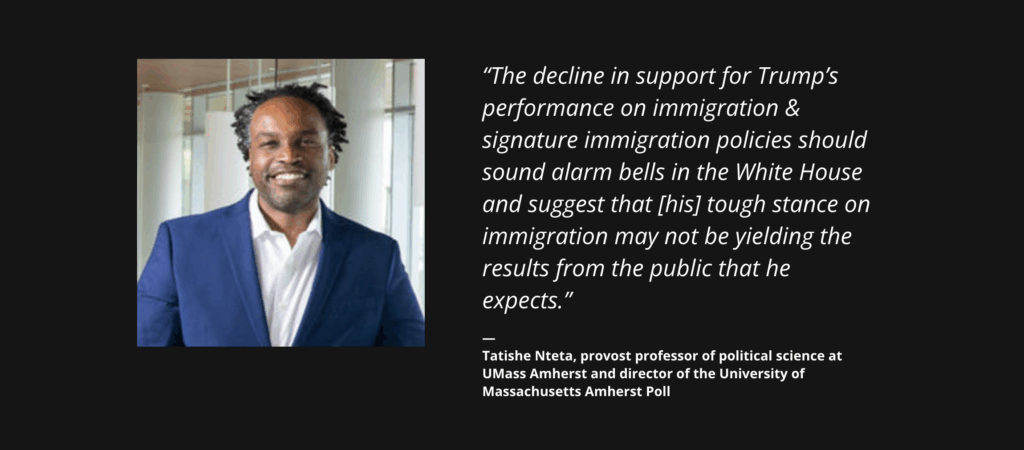
Raymond La Raja, Professor of Political Science at UMass Amherst and co-director of the poll, says that the current actions of the Trump administration may impact the future of long-term immigration policy in the U.S.
“Right now,” he says, “I would say that public opinion on legal immigration is stabilizing around a moderate position – nearly one-half of Americans (49%) want legal immigration levels to remain steady. And there appears to a declining appetite for cuts – the share of respondent who want to decrease legal immigration has dropped in the past four months from 29% to 23%. This could create political space for modest reforms or at least defense of the status quo.”
“These results suggest that the Trump administration, if it desires to be in step with the public that they represent, should emphasize the detention and removal of undocumented immigrants with criminal records,” Nteta adds. “Such a pivot would likely result in stronger public support of the president and his immigration policy more specifically.”
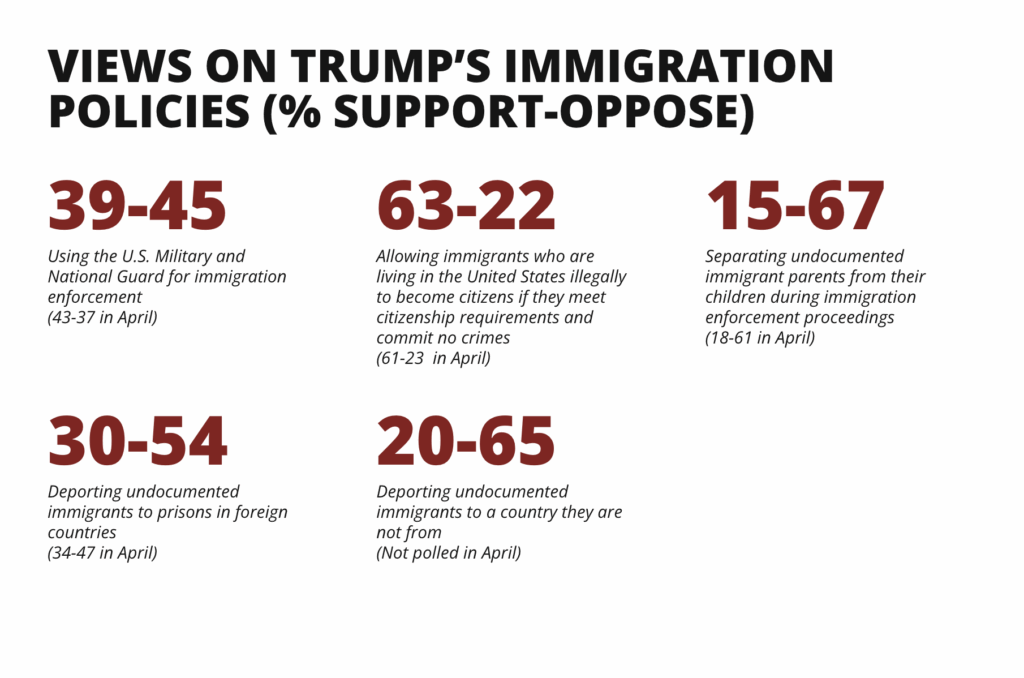
Immigrants’ Rights
When asked about their views on whether the constitutional rights enjoyed by natural-born American citizens, such as freedom of speech, the right to an attorney when accused of a crime, the right to a hearing before a judge before deportation, freedom from cruel and unusual punishment, and freedom from unreasonable searches and seizures, should apply to immigrants, 7-in-10 respondents of the new UMass Amherst Poll offered their overwhelming support for these rights applying to legal immigrants. Majorities of respondents voiced their support for most of these rights being applied to undocumented immigrants, as well.
“In an era where the fundamental rights of immigrants are under question, most Americans affirm that both legal and undocumented immigrants are entitled to the basic rights of freedom of speech, freedom from cruel and unusual punishment, and freedom from unreasonable searches and seizures, as well as the rights to an attorney and to a hearing before a judge before deportation,” says Jesse Rhodes, Professor of Political Science at UMass Amherst and co-director of the poll. “That said, Americans do draw a distinction between legal and undocumented immigrants and are much more supportive of the fundamental rights of legal immigrants than of undocumented immigrants.”
“Perhaps unsurprisingly, Democrats and Republicans are deeply divided over whether undocumented immigrants are entitled to basic constitutional rights,” Rhodes says. “More surprising, and interesting, are divisions based on age, education and income. Older people, people with a high school education or less, and those with lower incomes are much less likely to endorse the constitutional rights of undocumented immigrants than are younger people, people with advanced degrees, and those with high incomes. These generational and affluence divides are increasingly mapping on to our party politics, as Trump and his Republican supporters increasingly angle for the votes of older and less educated Americans, while Democrats seek the support of youthful Americans and those with higher educational attainment.”
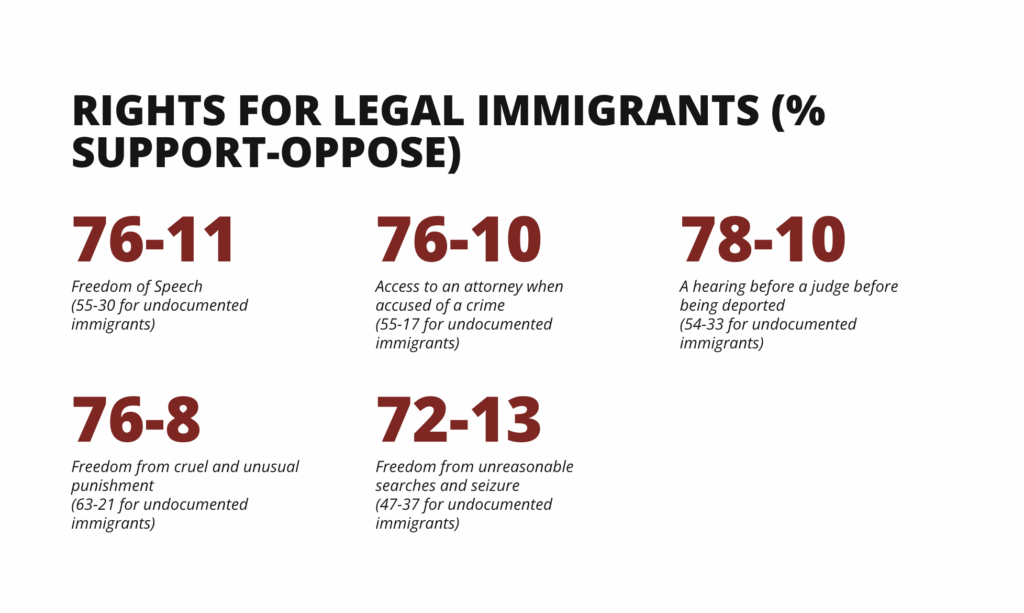
Nteta notes that the poll not only indicates public support for legal immigrants’ rights, but also an opposition to the administration’s response against those who have attempted to exercise their rights.
“In recent months, a number of legal immigrants who have been vocal in their opposition to American foreign policy have been detained by the Trump administration with the intention of deporting these immigrants back to their home nations,” Nteta says. “These policies are not popular among the American public as only 2-in-10 (22%) respondents support the deportation of legal immigrants who express opposition to American foreign policy. While we find similar levels of opposition to these efforts across gender, generational, class and racial groups, the only groups that express a modicum of enthusiasm for these deportations are Republicans, conservatives and Trump voters. However, even among these groups their support does not exceed 50%. With President Trump’s approval ratings on immigration issues continuing to falter, a shift away from the detention and removal of legal immigrants may be the prescription to halt this decline.”
Immigrants’ Citizenship
Trump, meanwhile, has also threatened revoking the rights of American citizens – including the ultimate threat of invalidating citizenship.
“Most Americans reject government power to revoke citizenship, especially when it challenges bedrock constitutional understandings like birthright and naturalization,” La Raja says. “The intensity of opposition outweighs support, indicating that attempts to normalize such policies would likely provoke a strong backlash. For example, supermajorities of 64% and 66% oppose revoking citizenship from naturalized or native-born Americans and over half – 52% and 58%, respectively – express strong opposition. The intensity against such policies drops somewhat for children born in the U.S. to parents who are here illegally, but, even here, about half of Americans (49%) would oppose not granting citizenship, while about one-third (34%) would invalidate such citizenship.”
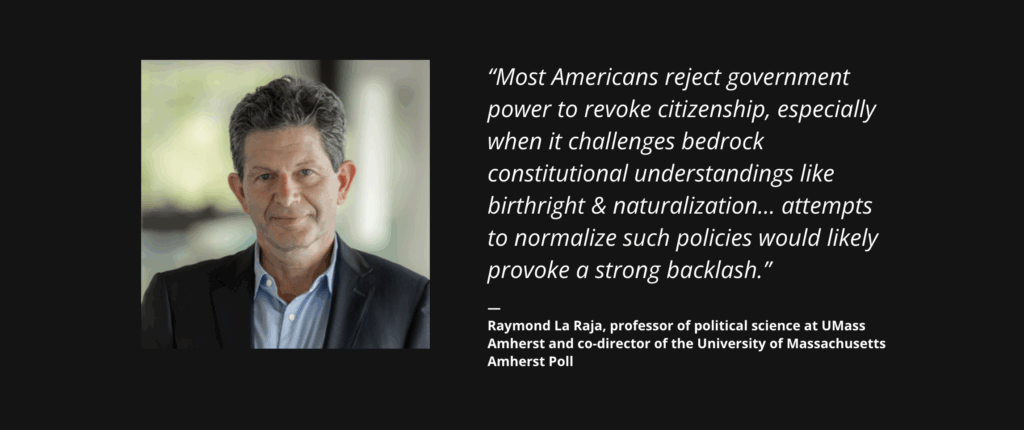
“Last month, Trump floated the idea that he and his administration had the power to revoke the citizenship of some of his most vocal critics, including native-born citizen and former talk show host Rosie O’Donnell, as well as legal immigrants such as Tesla founder Elon Musk and New York City mayoral candidate Zohran Mamdani,” adds Nteta. “While debates regarding the constitutionality of such efforts are ongoing, what is clear is that Americans are in strong opposition to these attempts to strip Americans of their citizenship; 64% of Americans oppose the invalidation of the citizenship of naturalized citizens and two-thirds oppose the invalidation of native-born citizens. With President Trump seeking to expand the powers of the presidency, our results indicate that allowing the federal government to invalidate American citizenship looks to be a non-starter.”
“This surprising, and troubling, level of support for the denaturalization of a class of birthright citizens reflects some Americans’ deep frustration with undocumented immigration and willingness to accept draconian measures to reduce it,” Rhodes warns. However, he also says that, “today, public discussion about undocumented immigration is dominated by those who advocate for punitive measures, but the reality is that a strong majority of Americans expresses welcoming views toward undocumented immigrants who are positive contributors to their communities – that is, the overwhelming majority of undocumented immigrants. Indeed, 63% of Americans support allowing undocumented immigrants who meet citizenship requirements and commit no crimes to become citizens.”
Decrease in Support for ICE Tactics
Compared to the national UMass Poll conducted in April, the new survey found decreased support for – and increased opposition to – many of the aspects underpinning the Trump administration’s approach to immigration, including the use of the military and National Guard to enforce immigration laws, separating immigrant parents from their children and deporting undocumented immigrants to foreign countries.
“Since our poll in April 2025, Americans have become more opposed to harsh anti-immigration measures,” Rhodes says. “For example, while 37% somewhat or strongly opposed using the military or National Guard to enforce immigration policy in April, 45% oppose it today. Similarly, 61% of Americans opposed separating undocumented parents from their children during immigration enforcement proceedings in April, that number is up to 67% today. Finally, opposition to deporting undocumented immigrants to foreign prisons is up by 7 percentage points, from 47% in April to 54% in July. It sure looks like President Trump’s stringent immigration enforcement policies have sparked a public backlash.”
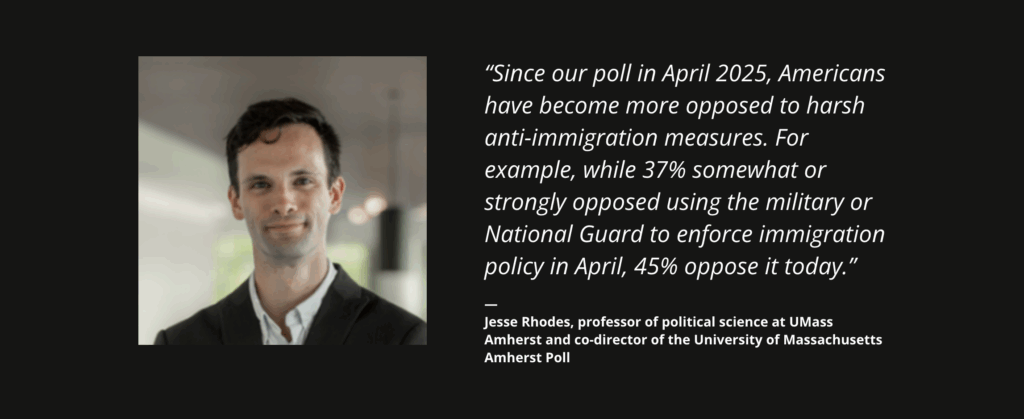
La Raja explains that the poll found stark differences in how respondents viewed the locations where immigration arrests are being made.
“When it comes to immigration enforcement, Americans believe sacred spaces still exist,” he says. “Majorities of the public reject immigration enforcement in churches (54%), schools (53%) and hospitals (52%). These are places where society typically prioritizes compassion, trust and care over coercion. For this reason, policymakers and ICE may face backlash when targeting these locations. However, public opinion is more fractured with respect to enforcement in other venues like homes (43% support, 37% oppose), businesses (40-41), workplaces (40-44), parks (41-40) and courts (43-40), suggesting enforcement in some public spaces is not considered sacred.”
La Raja notes that “those from high immigration communities – most notably Latinos – show the lowest support for ICE deployments, especially raids taking place in schools (18%) and churches (17%). Significant portions of this community may have more direct experience with immigration enforcement and may be more skeptical of aggressive tactics.”
He also points out the stark partisan differences with respect to where ICE deploys to make arrests.
“Notably, Republican voters overwhelmingly support ICE raids in all locations, including churches (58%), schools (65%) and hospitals (65%),” La Raja says. “Democrats, by contrast, show consistently low support, with single-digit support in these categories. Only 18% of Democrats support ICE raids at homes. Americans age 55 and older are also far more supportive of giving ICE leeway in places, including churches (39%), compared to just 20% for younger Americans age 19-29. We also see significant gender gaps. All of this suggests strong differences toward punitive immigration enforcement, with Republicans, older Americans and men more supportive.”
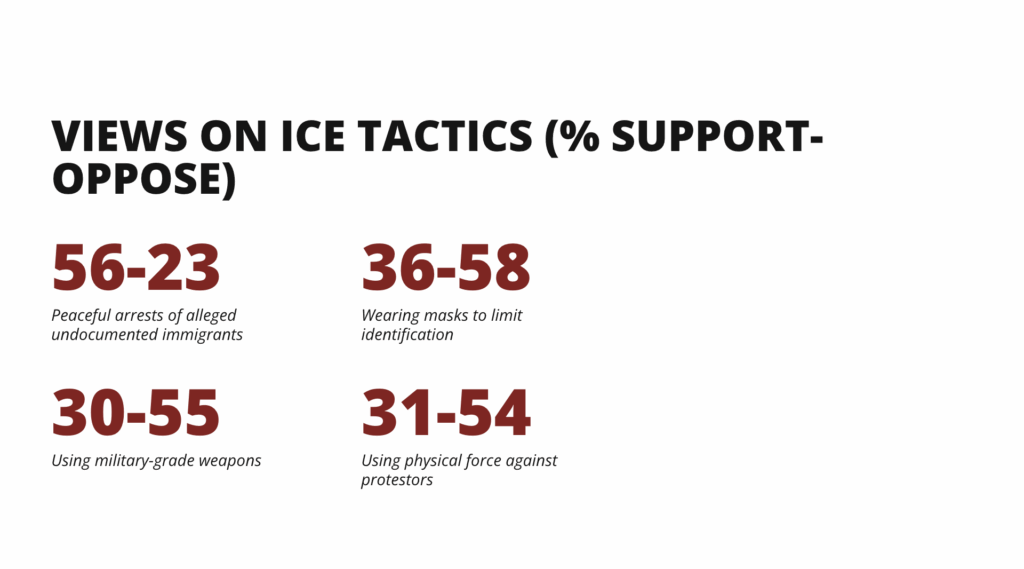
Rhodes also says that the poll found differing overall views on the tactics used by ICE, as well.
“A majority of Americans support the peaceful arrest of alleged undocumented immigrants by ICE,” he says, “but there is majority opposition to many of the controversial tactics that ICE has employed under the Trump administration, such as wearing masks to prevent identification, using military-style weaponry, and using physical force against protestors. Clearly, Americans have nuanced opinions about immigration enforcement. They support orderly enforcement of the nation’s immigration laws, but a majority of Americans recoil against harsh tactics.”
Rhodes also says the poll found mixed views on the tactics being used by those opposed to ICE’s more public and aggressive immigration enforcement activities, which have sparked widespread protests – both peaceful and disruptive – among Americans across the nation.
“Our poll sheds important light on public perception of these protests,” he explains. “Americans strongly support peaceful demonstrations and marches against aggressive ICE enforcement, but support falls off dramatically when protestors engage in aggressive tactics like obstructing arrests, destroying ICE property or accosting ICE officers. This suggests that protests against ICE may elicit considerable public support, but only if protestors refrain from disruptive and violent tactics.”
Views on Higher Education
The new UMass Amherst Poll also asked respondents about their views on a segment of American life greatly impacted by immigration policy over the past six months: higher education.
“There is little doubt U.S. colleges and research universities are, in many ways, the envy of the world, but those institutions of higher learning have also long drawn the ire of conservatives,” says Alexander Theodoridis, associate professor of political science at UMass Amherst and co-director of the poll. “So, it is not especially surprising that the Trump administration has made colleges and universities a target during its first six months.

“We find limited public support for many of the Trump higher education policies,” Theodoridis continues. “Only 17% of Americans support reducing federal support for scientific research at universities. Just 23% support requiring colleges and universities to consider ideological diversity in hiring and admissions decisions. Twenty-six percent want reductions in federal student loan support, 37% want to prohibit colleges and universities from implementing DEI policies and only 28% want to make it more difficult for students from other countries to attend school here. Thirty percent endorse punishing foreign students for Israel-Gaza activism. The most popular of the higher education policies we asked about was requiring colleges and universities to adopt new policies to protect Jewish students, which received 46% support.”
Opinions regarding many of these policies were polarized along party lines, Theodoridis explains. “Majorities of Republicans favor making it more difficult for international students to attend our universities, prohibiting campus DEI policies, punishing foreign students for Israel-Gaza activism, requiring new policies to protect Jewish students and reducing federal student loan support. However, reductions in funding for scientific research and consideration of ideological diversity in admissions and hiring were unpopular among both Democrats and Republicans. Just 23% of Republicans and 25% of Democrats favor consideration of ideological diversity in hiring and admissions, and only one-third of Republicans – and just 7% of Democrats – want reductions in federal research funding for universities.”
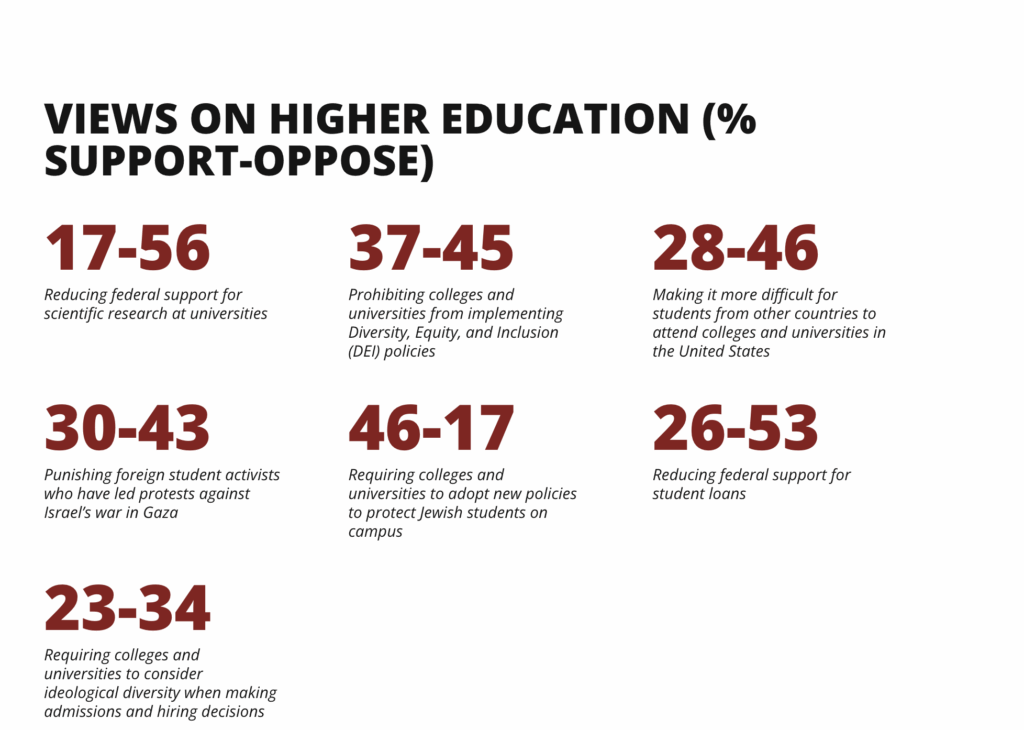
Topline results and crosstabs for the poll can be found at www.umass.edu/poll
